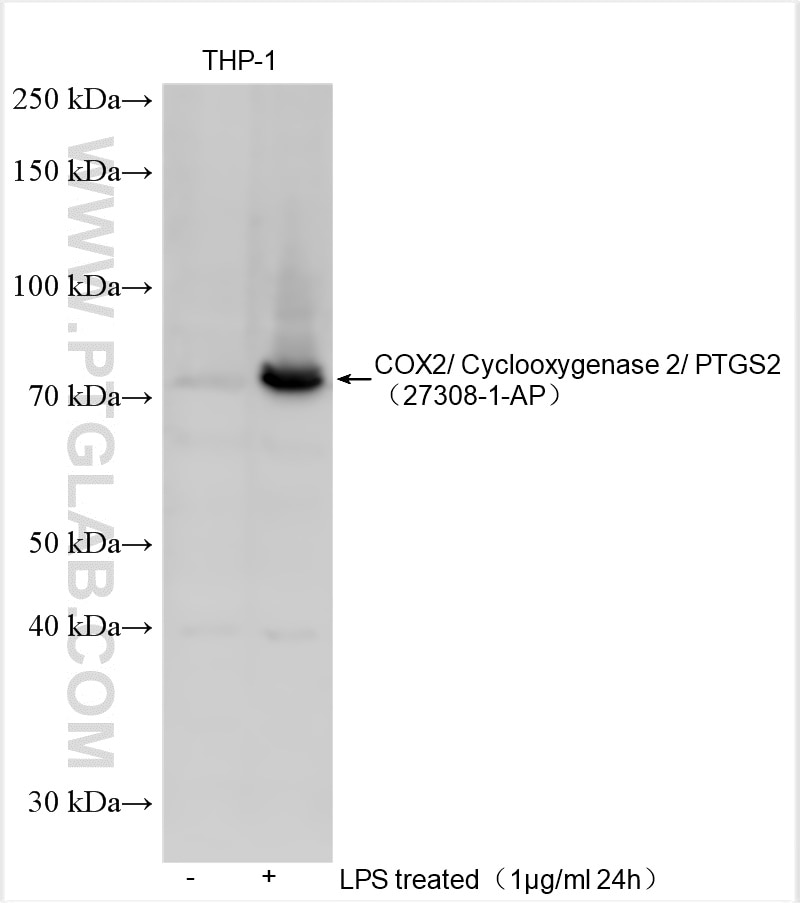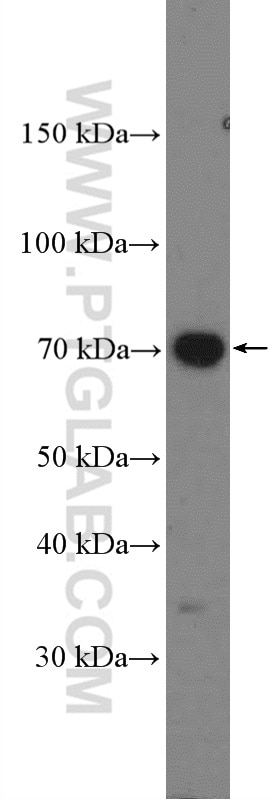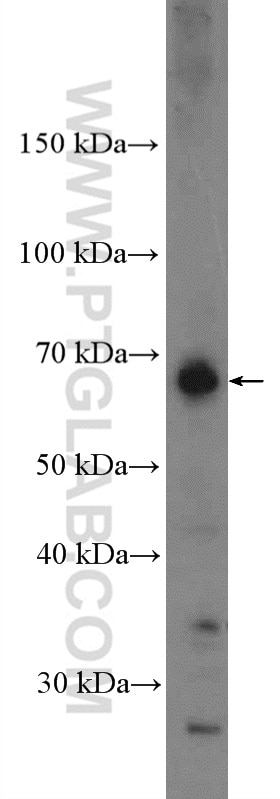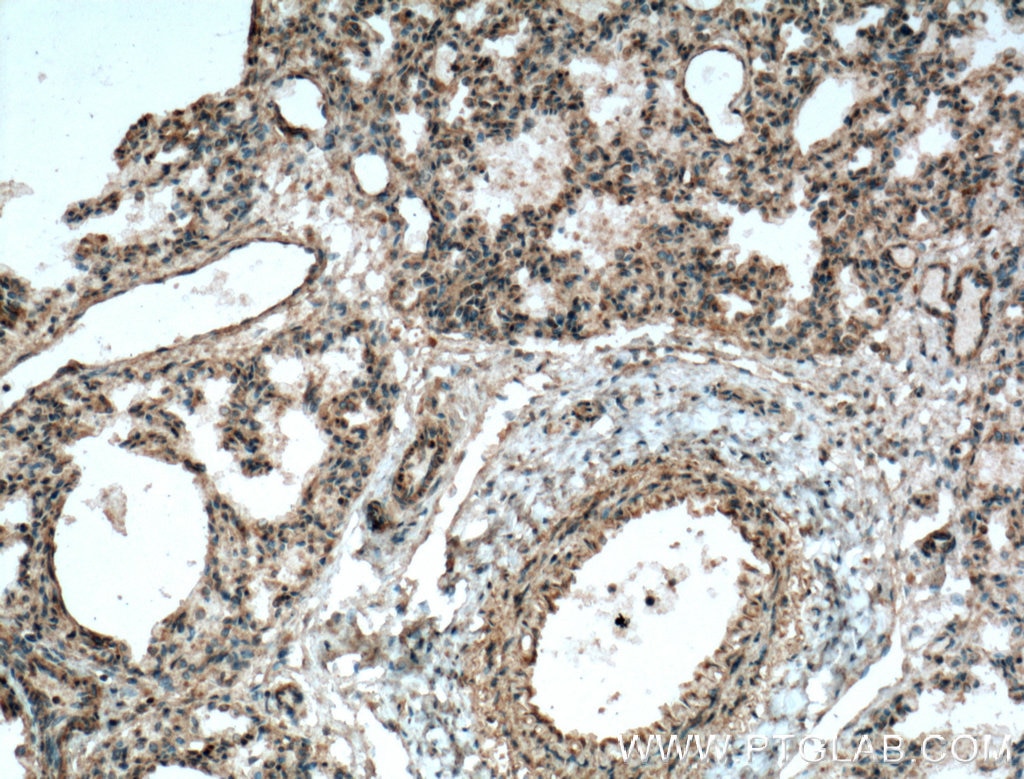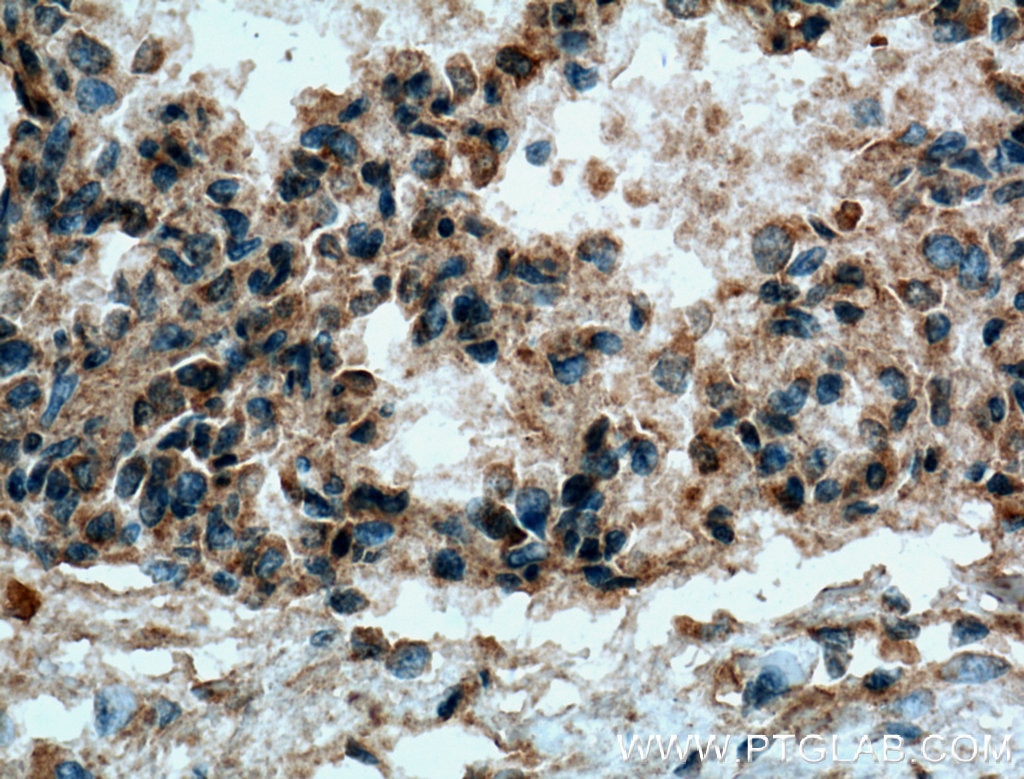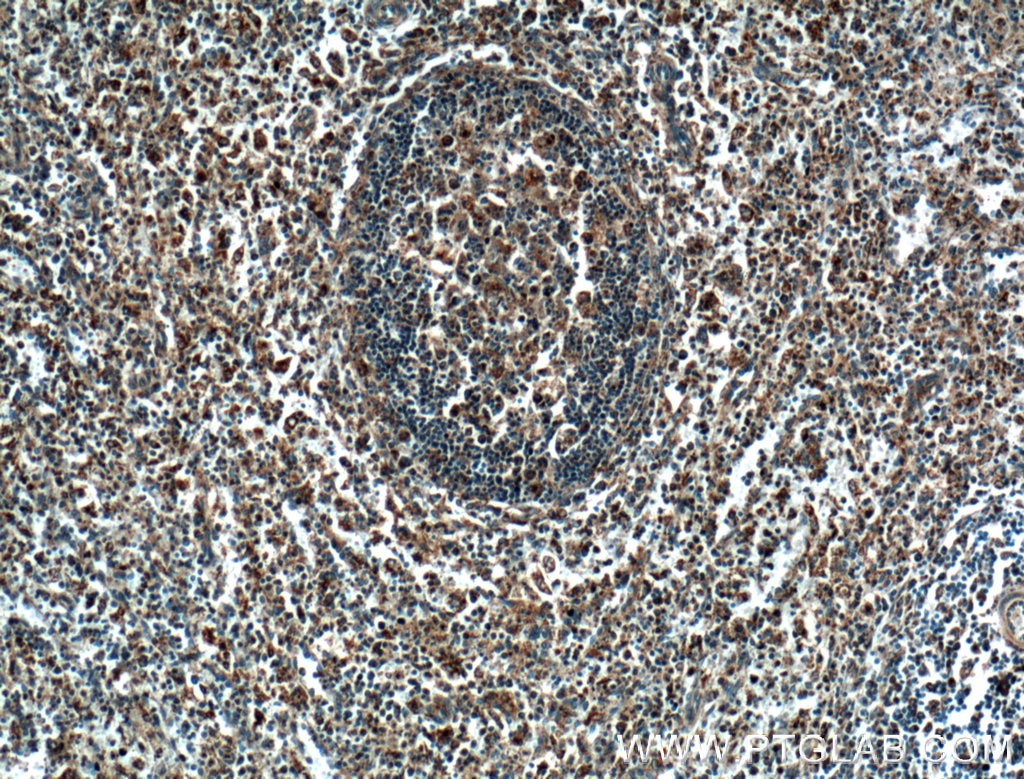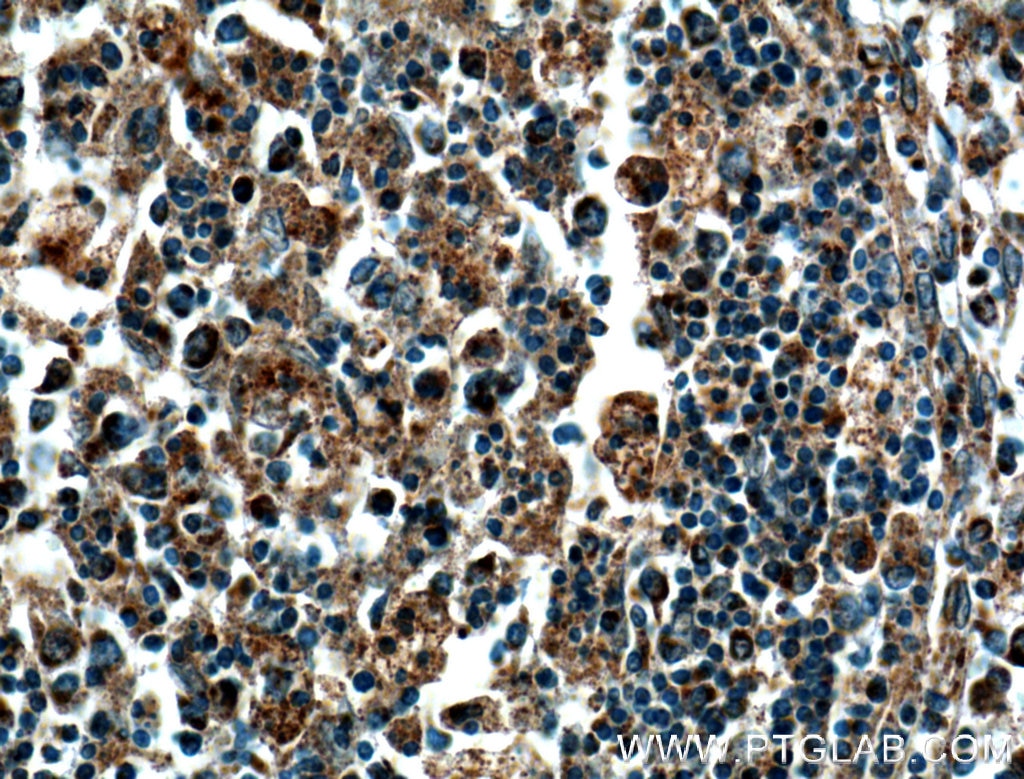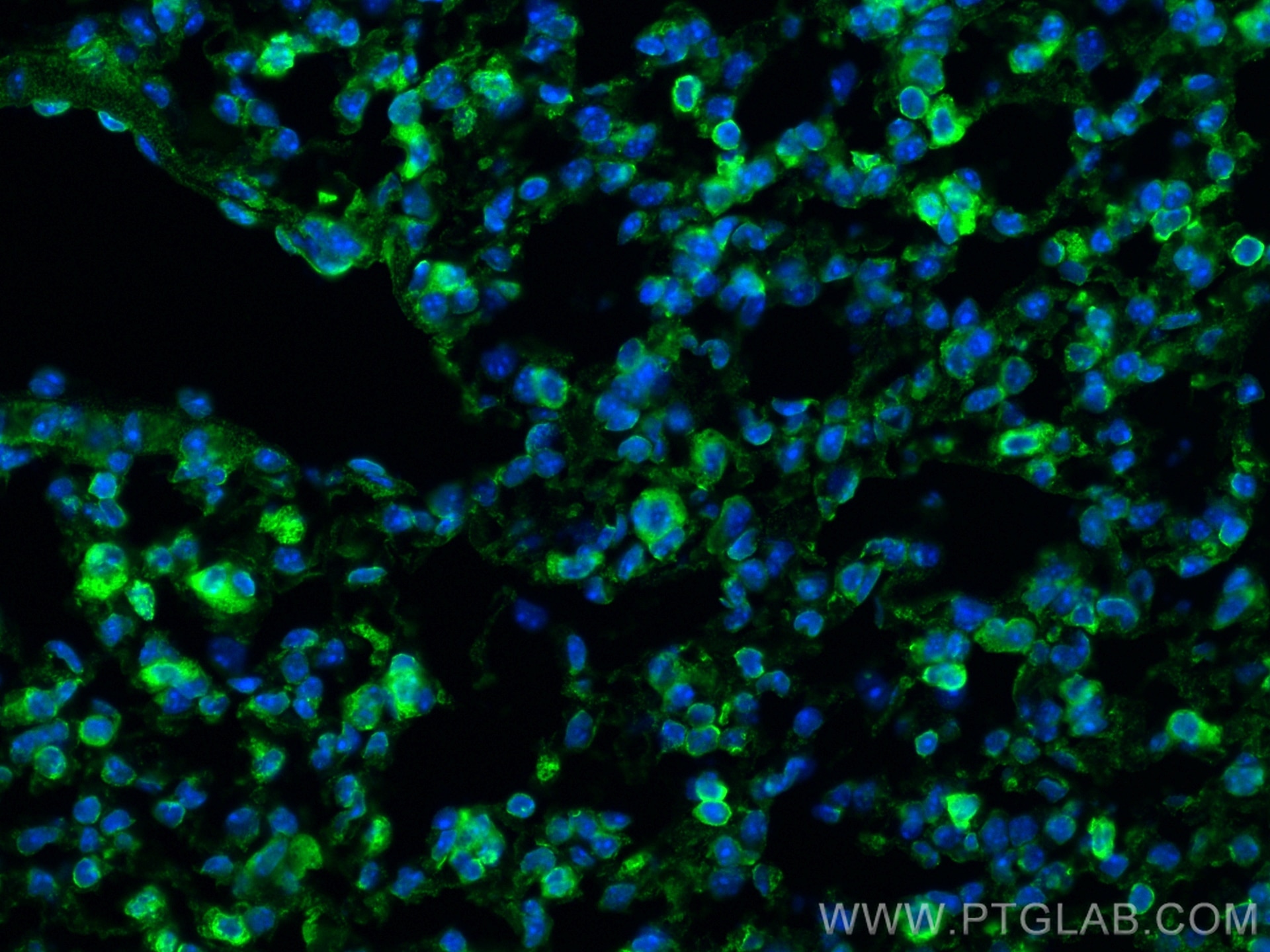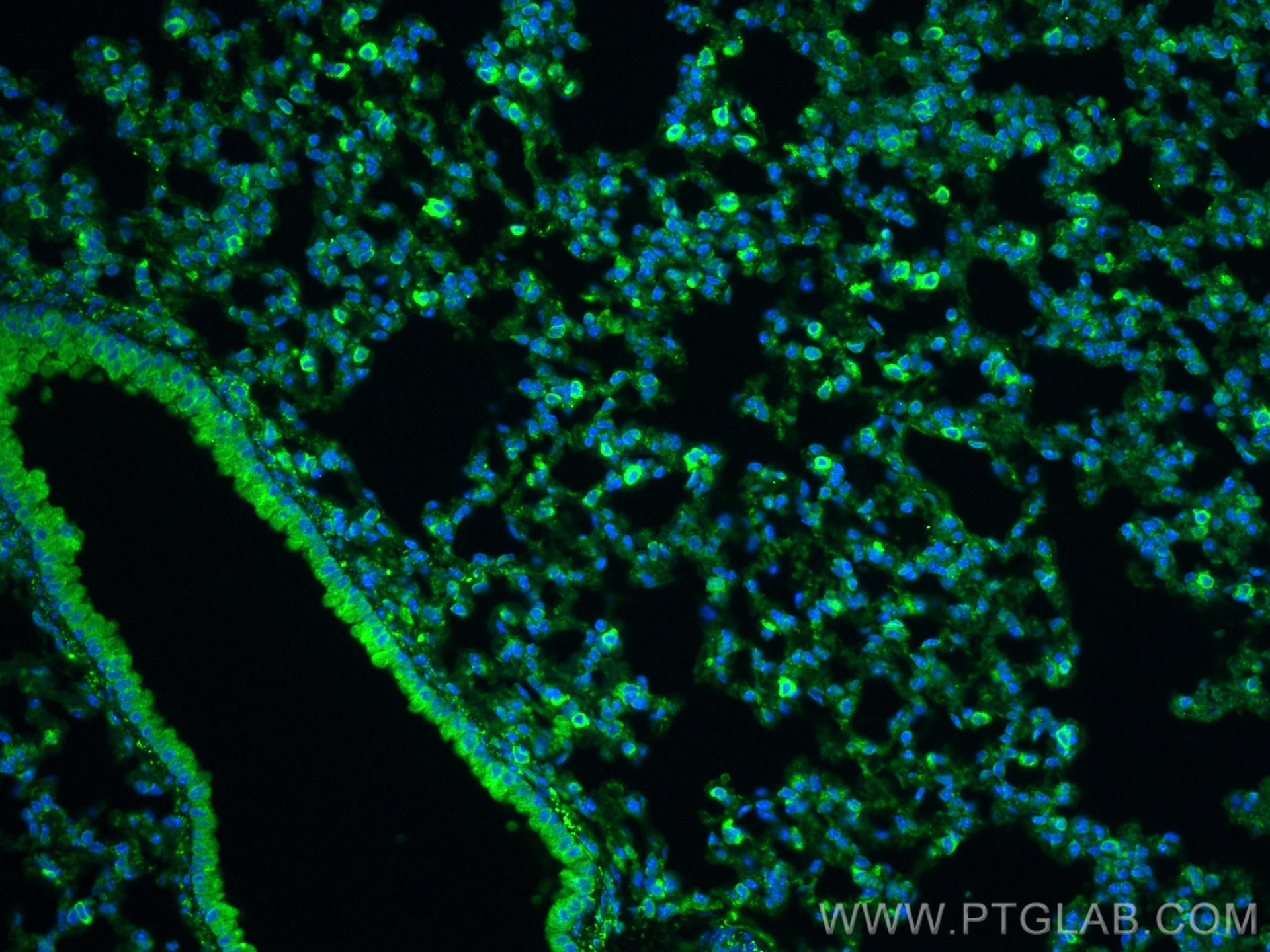Validation Data Gallery
Tested Applications
| Positive WB detected in | A549 cells, mouse lung tissue, THP-1 cells |
| Positive IHC detected in | human lung tissue, human spleen tissue Note: suggested antigen retrieval with TE buffer pH 9.0; (*) Alternatively, antigen retrieval may be performed with citrate buffer pH 6.0 |
| Positive IF-P detected in | mouse lung tissue |
COX-2 expression is undetectable in most normal tissues but dramatically upregulated during inflammation (PMID: 9249646, 18657230).
Recommended dilution
| Application | Dilution |
|---|---|
| Western Blot (WB) | WB : 1:600-1:6000 |
| Immunohistochemistry (IHC) | IHC : 1:100-1:400 |
| Immunofluorescence (IF)-P | IF-P : 1:50-1:500 |
| It is recommended that this reagent should be titrated in each testing system to obtain optimal results. | |
| Sample-dependent, Check data in validation data gallery. | |
Published Applications
| KD/KO | See 2 publications below |
| WB | See 97 publications below |
| IHC | See 12 publications below |
| IF | See 13 publications below |
| IP | See 1 publications below |
Product Information
27308-1-AP targets COX2/ Cyclooxygenase 2/ PTGS2 in WB, IHC, IF-P, IP, ELISA applications and shows reactivity with human, mouse samples.
| Tested Reactivity | human, mouse |
| Cited Reactivity | human, mouse, rat, pig, canine |
| Host / Isotype | Rabbit / IgG |
| Class | Polyclonal |
| Type | Antibody |
| Immunogen | COX2/ Cyclooxygenase 2/ PTGS2 fusion protein Ag26174 相同性解析による交差性が予測される生物種 |
| Full Name | prostaglandin-endoperoxide synthase 2 (prostaglandin G/H synthase and cyclooxygenase) |
| Calculated molecular weight | 604 aa, 68 kDa |
| Observed molecular weight | 69 kDa |
| GenBank accession number | BC013734 |
| Gene Symbol | COX2/PTGS2 |
| Gene ID (NCBI) | 5743 |
| RRID | AB_2880838 |
| Conjugate | Unconjugated |
| Form | Liquid |
| Purification Method | Antigen affinity purification |
| UNIPROT ID | P35354 |
| Storage Buffer | PBS with 0.02% sodium azide and 50% glycerol{{ptg:BufferTemp}}7.3 |
| Storage Conditions | Store at -20°C. Stable for one year after shipment. Aliquoting is unnecessary for -20oC storage. |
Background Information
COX2 is an enzyme involved in the synthesis of prostaglandins from arachidonic acid.
1. What is the molecular weight of COX2?
The fully N-glycosylated PTGS2 is 72-74 kDa and the aglycosylated is 66 kDa (PMID:19656660). It also
expresses a band of 39 kDa after unspecific cleavage (PMID:17509125). The 50 kDa band of fragmented
PTGS2 has also previously been detected in AD brains (PMID:14724276).
2. Is COX2 post-translationally modified?
COX2 is a subject of post-translational modifications, including phosphorylation, glycosylation, and
s-nitrosylation (PMID: 28939645).
3. What is the difference between COX1, COX2, and COX3?
There are three isoenzymes that have cyclooxygenase activity: COX1, COX2, and COX3. While COX1
is a ubiquitously expressed constitutive enzyme, expression of COX2 is generally low but can be rapidly
induced by various stimuli (as part of infection and inflammatory response) and is controlled by the
transcription factor NFκB. COX3 is an alternative splice variant of COX1 enzyme and is considered
non-functional in humans.
4. I cannot detect COX2 in my sample during western blotting.
Unlike COX1, COX2 expression is inducible by a variety of stimuli including certain growth factors, cytokines,
and proinflammatory stimuli. COX2 basal expression levels may be very low in unstimulated cells. Additionally,
the COX2 half-life time is short and after stimulation, COX2 protein can be quickly degraded to basal levels
(PMID: 10966456), which should be taken into account during experimental design.
5. What is the role of COX2 in cancer?
COX2 is often upregulated in various cancer types and increased expression of COX2 is associated with
greater angiogenesis of solid tumors, increased invasion, and metastasis, as well as decreased host immunity.
6. What is subcellular localization of COX2?
Both COX1 and COX2 are present in the endoplasmic reticulum (ER) and nuclear envelope (PMID: 9545330),
but COX2 has been reported to be more enriched in the nuclear envelope compared to COX1 (PMID: 7738031).
Protocols
| Product Specific Protocols | |
|---|---|
| WB protocol for COX2/ Cyclooxygenase 2/ PTGS2 antibody 27308-1-AP | Download protocol |
| IHC protocol for COX2/ Cyclooxygenase 2/ PTGS2 antibody 27308-1-AP | Download protocol |
| IF protocol for COX2/ Cyclooxygenase 2/ PTGS2 antibody 27308-1-AP | Download protocol |
| Standard Protocols | |
|---|---|
| Click here to view our Standard Protocols |
Publications
| Species | Application | Title |
|---|---|---|
Nucleic Acids Res MEN1 is a regulator of alternative splicing and prevents R-loop-induced genome instability through suppression of RNA polymerase II elongation | ||
Small M2 Macrophage Membrane-Mediated Biomimetic-Nanoparticle Carrying COX-siRNA Targeted Delivery for Prevention of Tendon Adhesions by Inhibiting Inflammation | ||
ACS Appl Mater Interfaces Programmable Polymeric Microneedles for Combined Chemotherapy and Antioxidative Treatment of Rheumatoid Arthritis. | ||
Redox Biol Topical hypochlorous acid (HOCl) blocks inflammatory gene expression and tumorigenic progression in UV-exposed SKH-1 high risk mouse skin. | ||
Int J Biol Macromol Flammulina velutipes polysaccharide exerts immunomodulatory function involving RSAD2 to regulate the NF-κB/MAPK signaling pathway in RAW264.7 macrophage cells and in mouse spleen cells | ||
J Control Release Combination of mitochondria impairment and inflammation blockade to combat metastasis |
